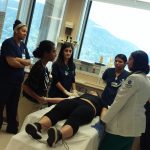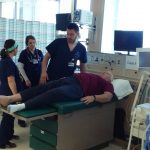Health and Medicine
 (VDH release) Following heavy rain events this week, the Virginia Department of Health (VDH) reminds people to take precautions to avoid flooded areas, and once the sun comes out, be aware of potential health risks before you participate in recreational water activities.
(VDH release) Following heavy rain events this week, the Virginia Department of Health (VDH) reminds people to take precautions to avoid flooded areas, and once the sun comes out, be aware of potential health risks before you participate in recreational water activities.
Heavy rains can increase the risk of exposure to animal waste and inadequately treated wastewater from sewage treatment plants. Bacteria, debris and other pollutants are collected by rainwater as it travels over the land and ends up in rivers, lakes and streams. This mix of rain and pollution can pose risks to human health and safety. Rain events also cause flooding and fast-moving waters, especially in low-lying areas.
The most common illnesses from contaminated water are gastrointestinal illnesses. This may cause vomiting, diarrhea, nausea, abdominal pain or fever. These illnesses result from swallowing water contaminated by disease-causing microbiological organisms. Additionally, contact with contaminated water has the potential to cause upper respiratory (ear, nose, throat) and skin infections.

(AP photo)
Legal opioids – painkillers – have been a gateway to addiction for some. Twice a year the DEA sponsors national Drug Take Back Days. There’s another one in Roanoke tomorrow, as WFIR’s Gene Marrano reports:
You can click here to find the drug takeback locations nearest you.
 A church bus hits a tractor-trailer full of ammonia; multiple injuries and breathing problems ensue. That was this year’s mock scenario at an “Interprofessional Education Simulation” last week. WFIR’s Gene Marrano follows up on a story we first told you about last week:
A church bus hits a tractor-trailer full of ammonia; multiple injuries and breathing problems ensue. That was this year’s mock scenario at an “Interprofessional Education Simulation” last week. WFIR’s Gene Marrano follows up on a story we first told you about last week:
 A new non-profit organization was launched this week with the goal of promoting inclusivity and serving the LGBTQ+ community of Southwest Virginia. WFIR’s Lillian Boyd has more on what Star City Virginia Pride plans on getting done this year.
A new non-profit organization was launched this week with the goal of promoting inclusivity and serving the LGBTQ+ community of Southwest Virginia. WFIR’s Lillian Boyd has more on what Star City Virginia Pride plans on getting done this year.
The nonprofit functions to serve its members and LGBTQ community through leadership development, education, and community events. SCVP announced its first short term quartly goal this week: that’s to fill the pantry and community supply closet the Drop In Center. Brandelin Stanfill is the vice president of public relations:
“In the LGBTQ community, we ask for inclusion. We want there to be a diverse acceptance of us.”
The Drop-In Center provides HIV testing, prevention counseling, and support for those living with HIV/AIDS. Collections will be made from now until June 15th, drop off locations are listed at starcityvapride.org.

G Marrano/WFIR photos
A church school bus crashes into a truck carrying ammonia. Multiple injuries, a hectic emergency department and irate, worried spouses. It wasn’t real, but the 10th annual “Inter-professional Education Simulation” at Jefferson College of Health Sciences. About 300 students from Jefferson College, the Virginia Tech Carilion School of Medicine and Radford University took part – diagnosing volunteers acting as trauma patients, then treating them. Whiter says it takes almost a year to come up with a new disaster scenario. Kimberly Whiter oversees the exercise:









 With everything else making news in Washington these days the debate over health care has taken a back seat. But US Senator Tim Kaine may want to put it on the front burner again as WFIR’s Gene Marrano reports:
With everything else making news in Washington these days the debate over health care has taken a back seat. But US Senator Tim Kaine may want to put it on the front burner again as WFIR’s Gene Marrano reports: Carilion Clinic President and CEO Nancy Agee has been chair of the American Hospital Association board since January but her formal investiture took place over the weekend.
Carilion Clinic President and CEO Nancy Agee has been chair of the American Hospital Association board since January but her formal investiture took place over the weekend. Making sure young hearts are healthy – and that others can be restarted – a Virginia Tech Carilion medical school professor has both goals in mind as WFIR’s Gene Marrano reports:
Making sure young hearts are healthy – and that others can be restarted – a Virginia Tech Carilion medical school professor has both goals in mind as WFIR’s Gene Marrano reports: They often say “Laughter is the best medicine” and the spring time art exhibit opening with a public reception on Wednesday at the Virginia Tech Carilion School of Medicine will demonstrate just that, as WFIR’s Gene Marrano reports:
They often say “Laughter is the best medicine” and the spring time art exhibit opening with a public reception on Wednesday at the Virginia Tech Carilion School of Medicine will demonstrate just that, as WFIR’s Gene Marrano reports: